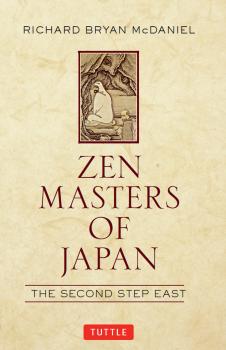ТОП просматриваемых книг сайта:
Richard Bryan McDaniel
Список книг автора Richard Bryan McDanielАннотация
Zen Masters of Japan is the second book in a series that traces Zen's profoundly historic journey as it spread eastward from China and Japan, toward the United States. Following Zen Masters of China , this book concentrates on Zen's significant passage through Japan. More specifically, it describes the lineage of the great teachers, the Zen monk pioneers who set out to enlighten an island ready for an inner transformation based on compassionate awareness.While the existing Buddhist establishment in Japan met early Zen pioneers like Dogen and Eisai with fervent resistance, Zen Buddhism ultimately persevered and continued to become further transformed in its passage through Japan. The Japanese culture and Japanese Buddhism practices further deepened and strengthened Zen training by combining it with a variety of esoteric contemplative arts—the arts of poetry, the tea ceremony, calligraphy, and archery. Zen Masters of Japan chronicles this journey with each Zen master profiled. The book shows how the new practices soon gained popularity among all walks of life—from the lowly peasant, offering a hope of reincarnation and a better life; to the Samurai warrior due to its casual approach to death; to the ruling classes, challenging the intelligentsia because of its scholarly roots.A collection of Zen stories, meditation, and their wisdom, Zen Masters of Japan also explores the elusive state of 'No Mind' achieved in Japan that is so fundamental to Zen practices today.
Аннотация
Zen Masters of China presents more than 300 traditional Zen stories and koans, far more than any other collection. Retelling them in their proper place in Zen's historical journey through Chinese Buddhist culture, it also tells a larger story: how, in taking the first step east from India to China, Buddhism began to be Zen.The stories of Zen are unlike any other writing, religious or otherwise. Used for centuries by Zen teachers as aids to bring about or deepen the experience of awakening, they have a freshness that goes beyond religious practice and a mystery and authenticity that appeal to a wide range of readers.Placed in chronological order, these stories tell the story of Zen itself, how it traveled from West to East with each Zen master to the next, but also how it was transformed in that journey, from an Indian practice to something different in Chinese Buddhism (Ch'an) and then more different still in Japan (Zen). The fact that its transmission was so human, from teacher to student in a long chain from West to East, meant that the cultures it passed through inevitably changed it. Zen Masters of China is first and foremost a collection of mind-bending Zen stories and their wisdom. More than that, without academic pretensions or baggage, it recounts the genealogy of Zen Buddhism in China and, through koan and story, illuminates how Zen became what it is today.


